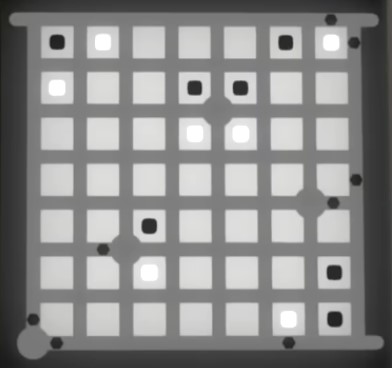Puzzle design thoughts
With Gridspech wrapping up soon, here's some amateur thoughts on Witnesslike design philosophies for fun. I might make a few more posts down the road.
Rule communication vs rule experimentation
A central aspect of witnesslikes is rule learning, but not all of these games are about rule communication. The Witness has this sense that the game wants you to know the rules. Once you've learned them, there's a brilliant feeling of nonverbal connection.
Meanwhile, Understand and Insight aren't interested in teaching you anything - figuring out the rules on your own is central to the challenge. Rule experimentation is mandatory.
I went with a more communicative style for Gridspech. I like that feeling of "Ahhh, I see what you're trying to say here!"
The rule experimentation approach feels a little too... I guess, antagonistic sometimes. Some people like the challenge, but it's less accessible.
Which brings us to player retention. Gridspech is a pretty linear game, which means if you get stuck, I'm likely to lose you. Really it's not easy to keep a brain invested in a 1. minimalist 2. free 3. web game, so being more communicative keeps players moving at a decent pace.
Deduction vs fiddling
Everything I discuss in this next section has nothing to do with rule learning. This is about puzzle design after the player has already learned the rules.
Witnesslikes are mostly stateless and grid-based, which makes them reminiscent of paper puzzles. Paper puzzles are typically 100% deductive and 0% guesswork - meanwhile, most witnesslikes have a lot of "fiddling" where you just kind of... wiggle around until you see the solution? This is prevalent even in The Witness itself.
Despite the connotation, fiddling isn't inherently bad! But it's a very risky design space. Whether the process feels like an intuition-tickling hunt or mindless trial and error is entirely subjective, and there really is no definitive sweet spot, you just kind of pick your own balance.
I'd say Taiji is the most deductive witnesslike, and often I really do feel like I'm playing a paper puzzle as I watch the logic cascade across the grid.
Insight leans more fiddly and intuitive. I feel like you either see the shapes you need, or you don't.
Ideally, a Gridspech puzzle gets a few "deductive anchors" that limit the possibility space and reward player observation, then make it fiddle from there. One of The Witness' classic early puzzles encapsulates this pretty well:

At best this approach engages more of the player's mental surface area, aiming for a holistic satisfaction, i.e. I deductively identified logical anchors, and I also "saw" the solution on an intuitive level. After solving the above puzzle, the idea is that the player feels like they've grown both in knowing the implications of the mechanics, and in feeling the forms these symbols naturally suggest.
At worst, it sends mixed messages:
"Are you expecting me to see something concrete? Should I keep staring at this, or are you just expecting me to go at it and wiggle around this time?"
"I solved this after ages of trial and error, I don't know if there were logical steps I was supposed to follow, but if so I sure didn't see it."
That's disorienting and frustrating because it blurs expectations about what the game wants from you. Sounds like a death sentence for a puzzle game right? It's an interesting problem - and a big problem for Gridspech. You want enough openness to let players to say, “Ahh, how did I not see that!”, while avoiding “How was I supposed to see that?”
Gridspech
A puzzle game about grids and symbols
| Status | Released |
| Author | krackocloud |
| Genre | Puzzle |
| Tags | 2D, Abstract, Minimalist, Singleplayer, the-witness, witness |
More posts
- Aug 2024 updateAug 27, 2024
- postmortemFeb 19, 2023
- Gridspech is done!Jan 10, 2023
- Wrapping up developmentDec 02, 2022
Leave a comment
Log in with itch.io to leave a comment.